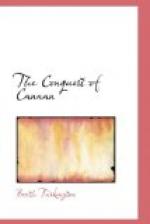The best of those who gathered ominously about the Court-house and its purlieus were the young farmers and field-hands, artisans and clerks; one of the latter being a pimply faced young man (lately from the doctor’s hands), who limped, and would limp for the rest of his life, he who, of all men, held the memory of Eskew Arp in least respect, and was burningly desirous to revenge himself upon the living.
The worst were of that mystifying, embryonic, semi-rowdy type, the American voyou, in the production of which Canaan and her sister towns everywhere over the country are prolific; the young man, youth, boy perhaps, creature of nameless age, whose clothes are like those of a brakeman out of work, but who is not a brakeman in or out of work; wearing the black, soft hat tilted forward to shelter—as a counter does the contempt of a clerk—that expression which the face does not dare wear quite in the open, asserting the possession of supreme capacity in wit, strength, dexterity, and amours; the dirty handkerchief under the collar; the short black coat always double-breasted; the eyelids sooty; one cheek always bulged; the forehead speckled; the lips cracked; horrible teeth; and the affectation of possessing secret information upon all matters of the universe; above all, the instinct of finding the shortest way to any scene of official interest to the policeman, fireman, or ambulance surgeon,—a singular being, not professionally criminal; tough histrionically rather than really; full of its own argot of brag; hysterical when crossed, timid through great ignorance, and therefore dangerous. It furnishes not the leaders but the mass of mobs; and it springs up at times of crisis from Heaven knows where. You might have driven through all the streets of Canaan, a week before the trial, and have seen four or five such fellows; but from the day of its beginning the Square was full of them, dingy shuttlecocks batted up into view by the Tocsin.




